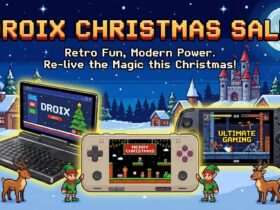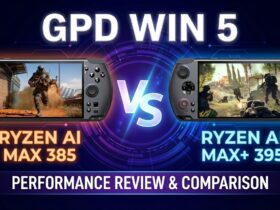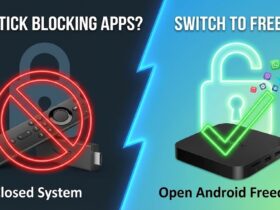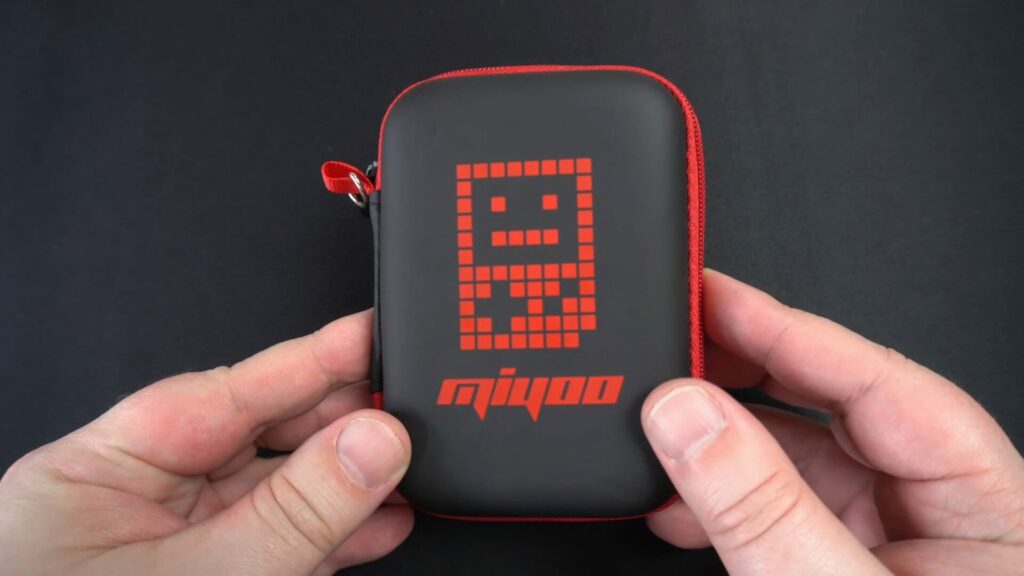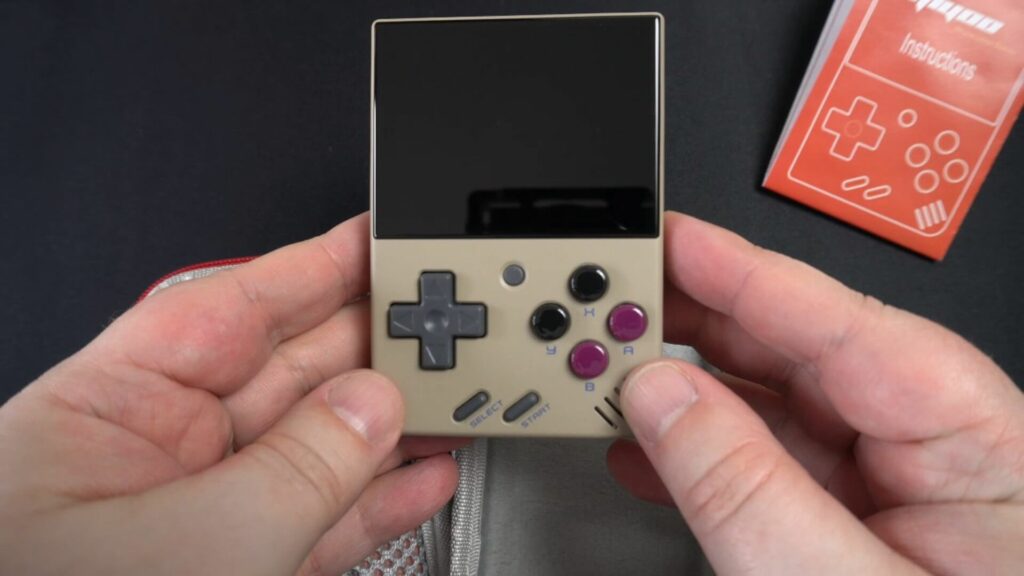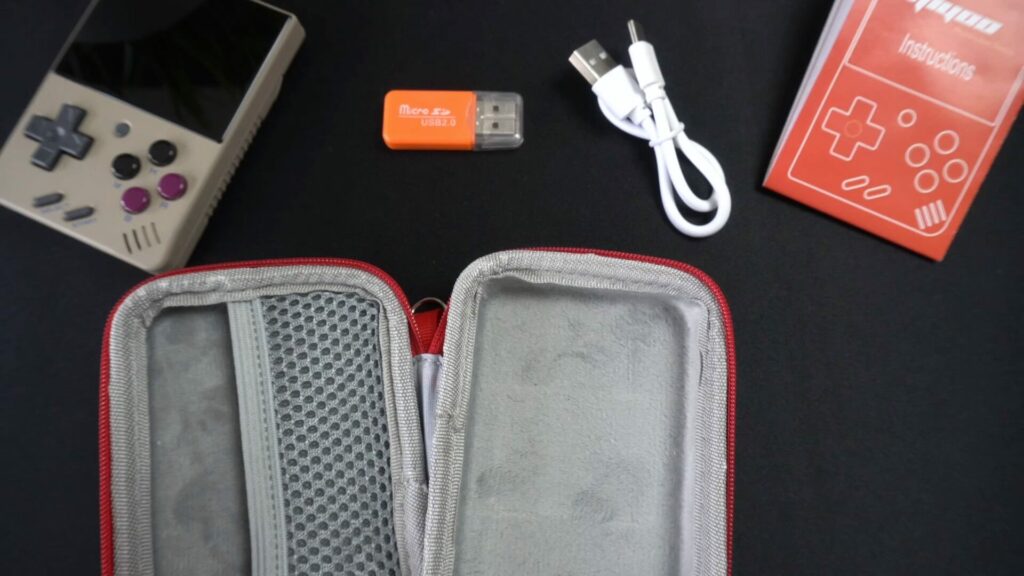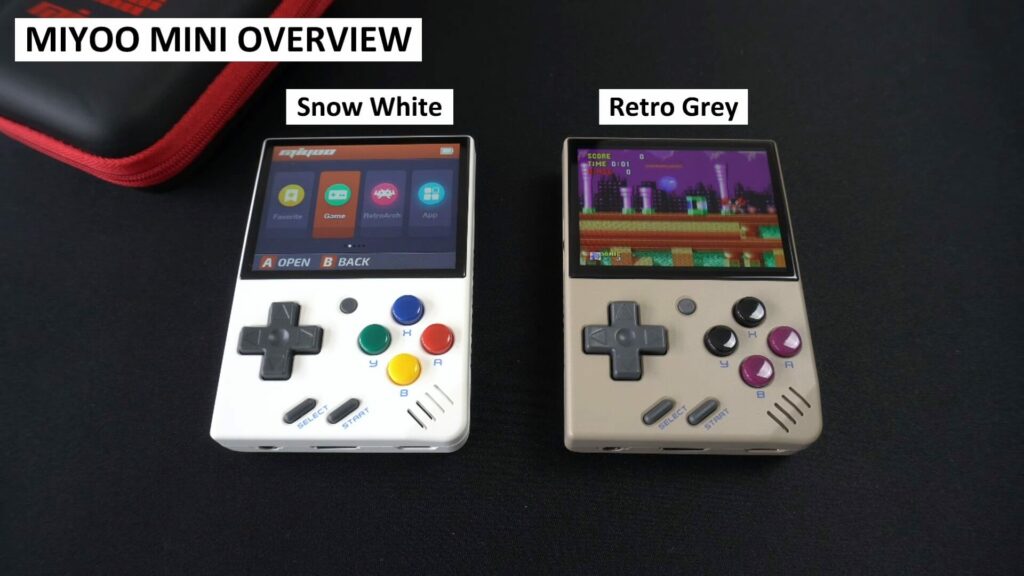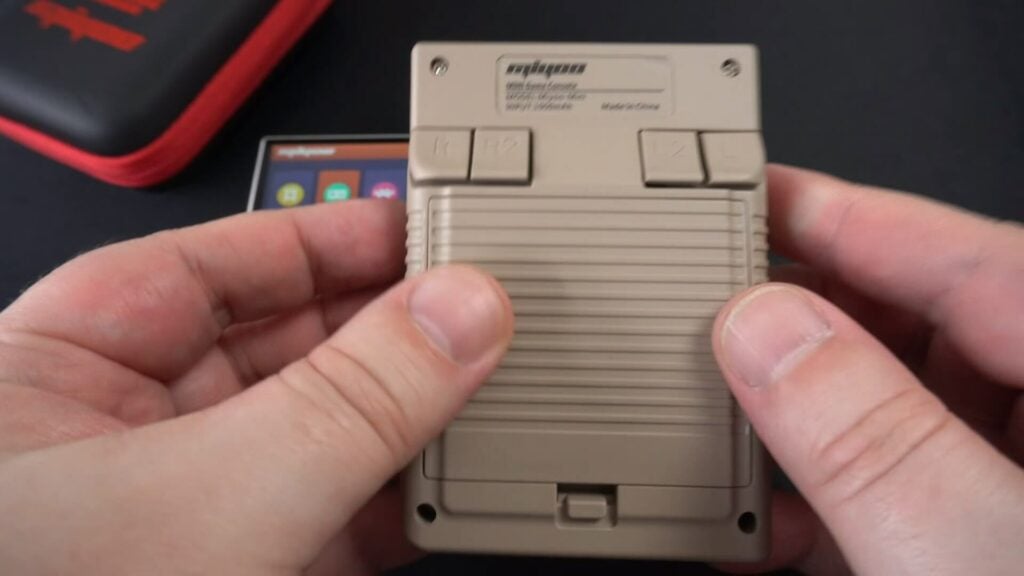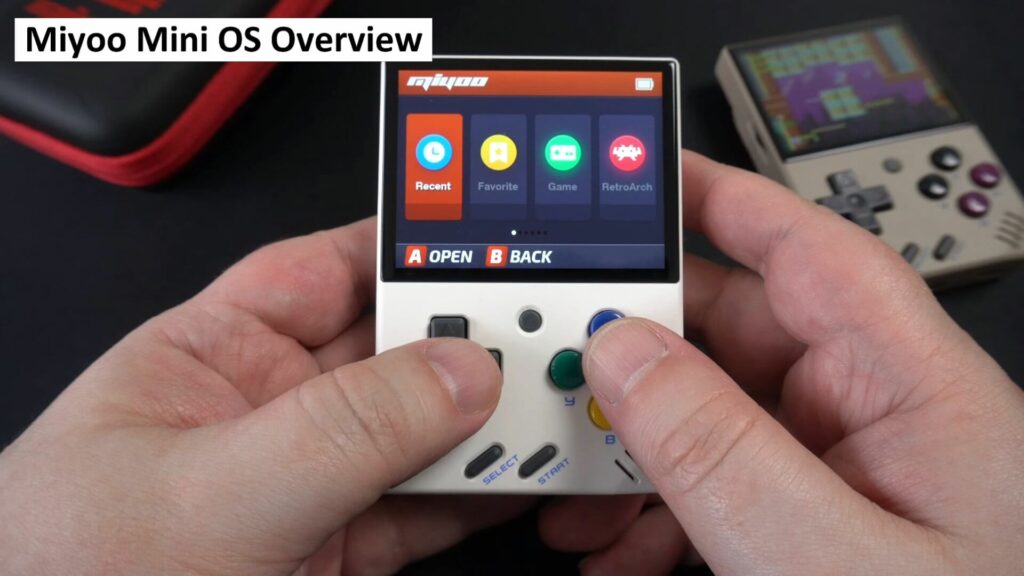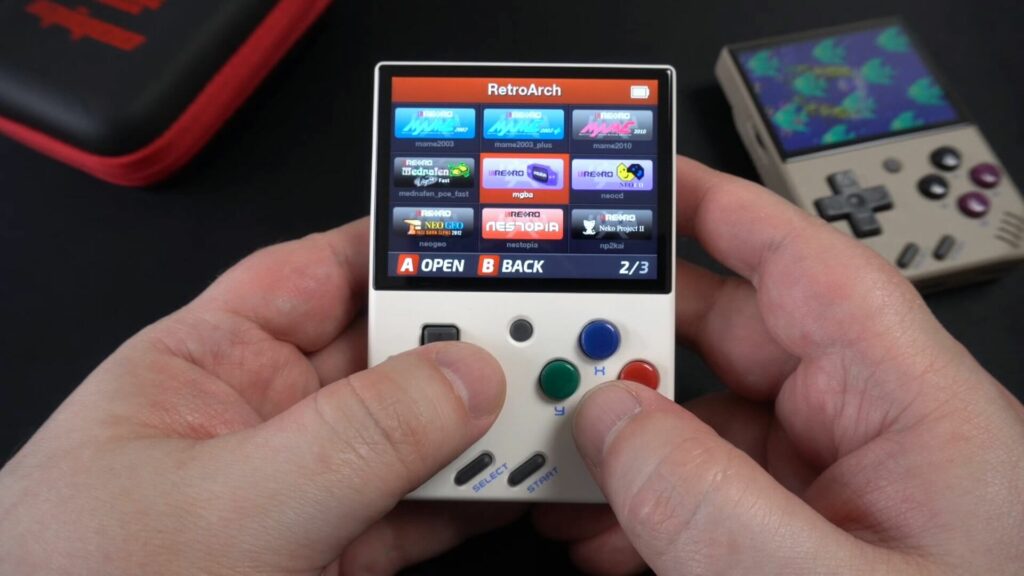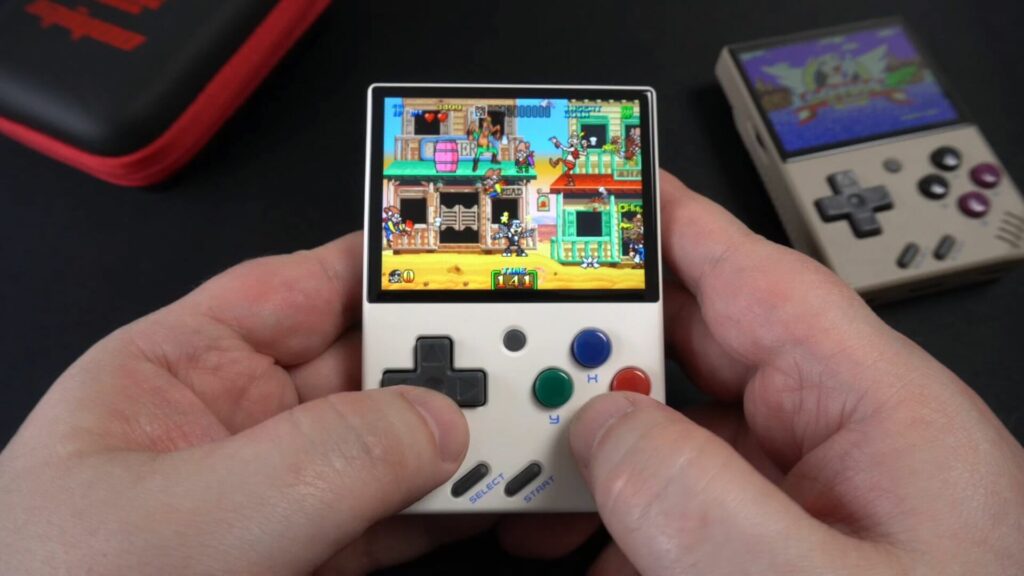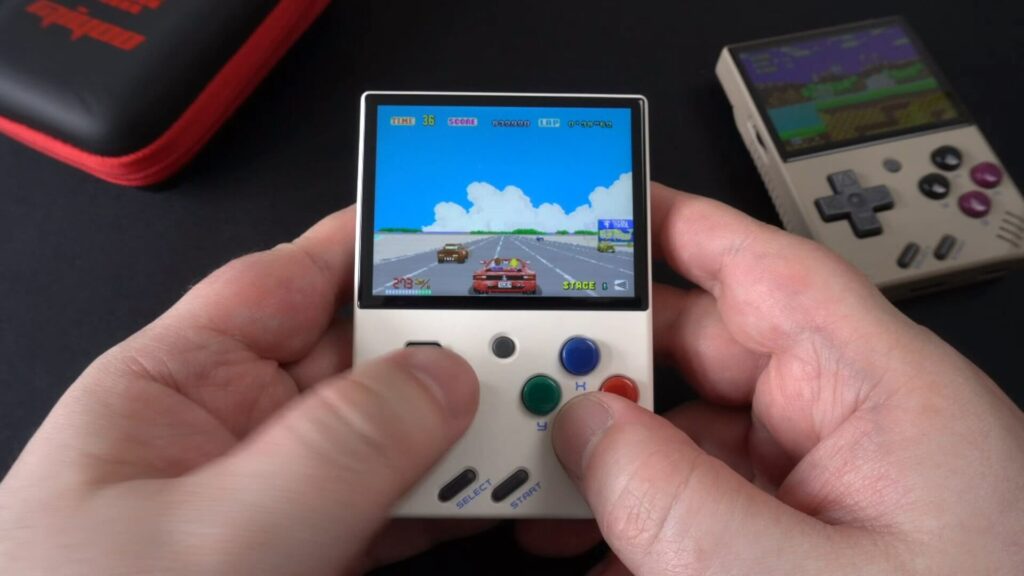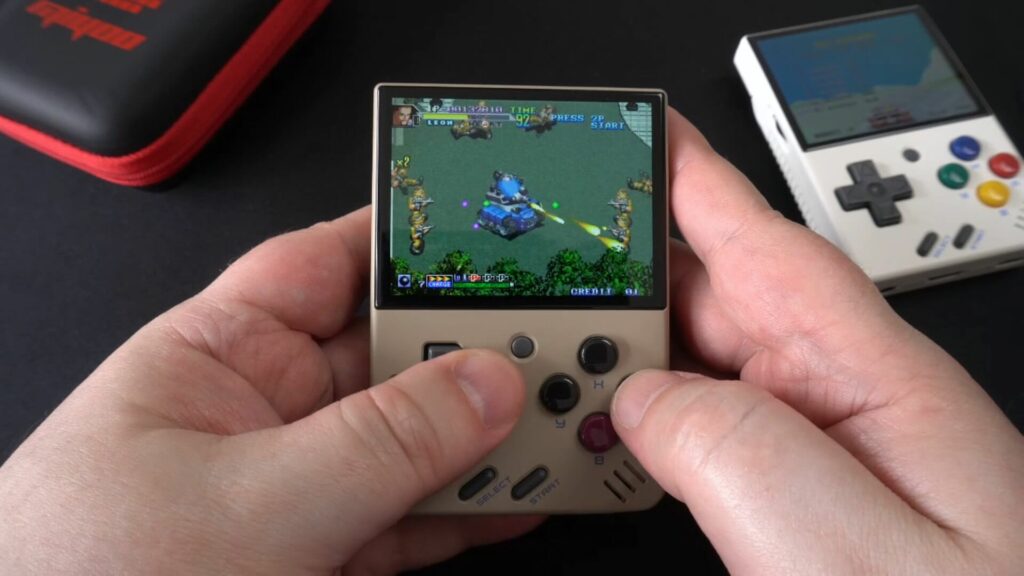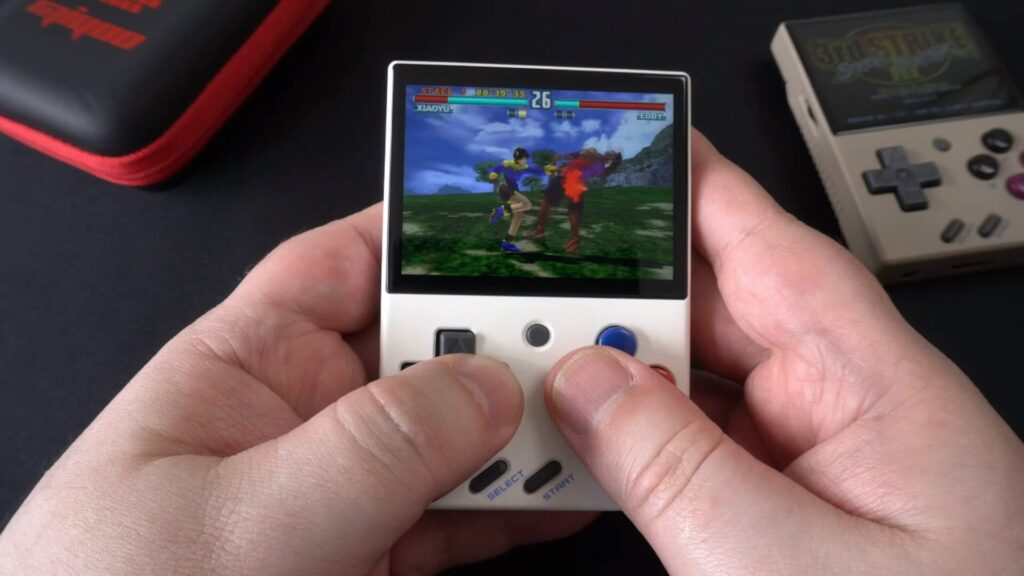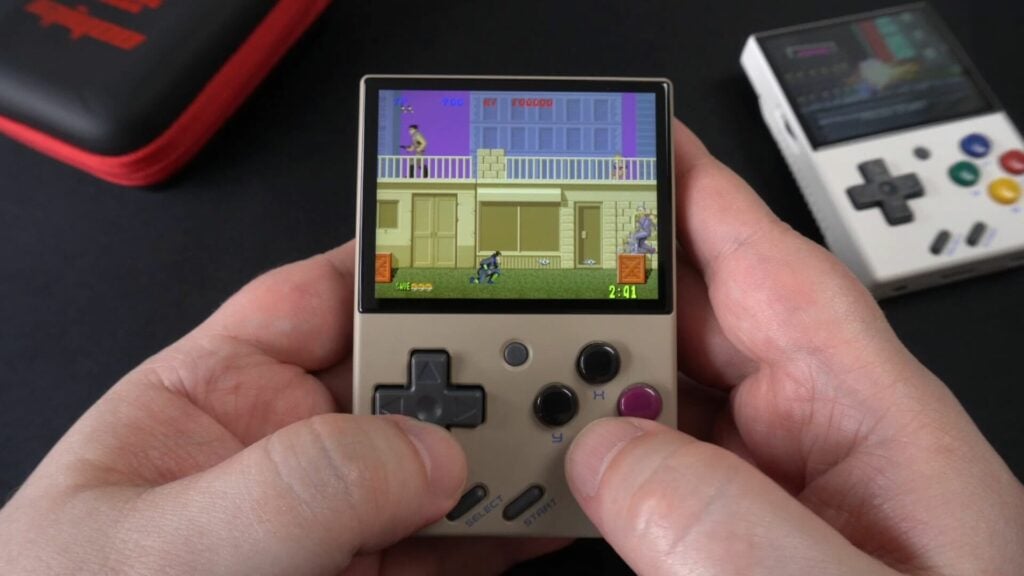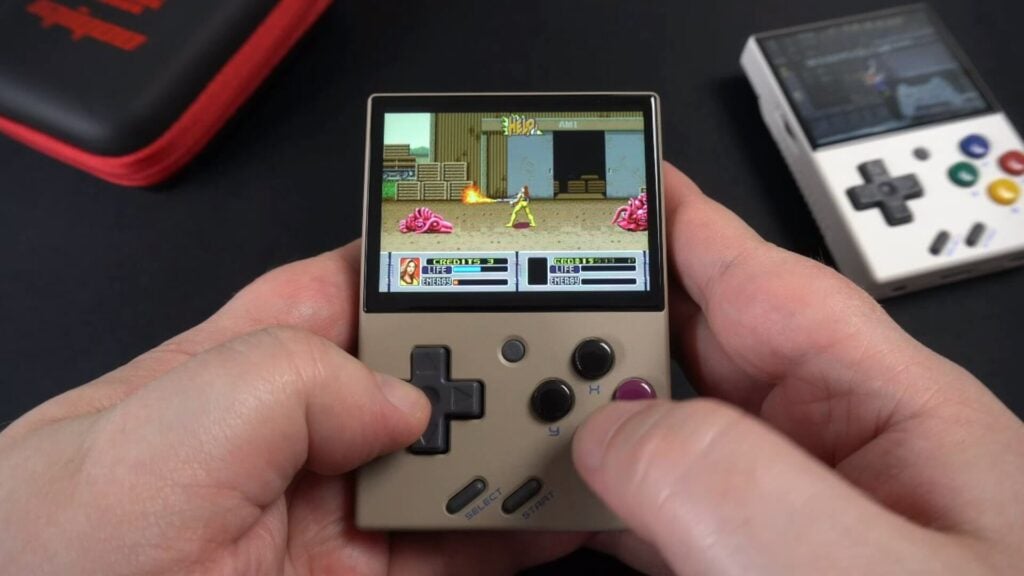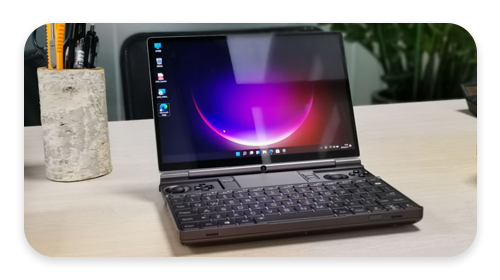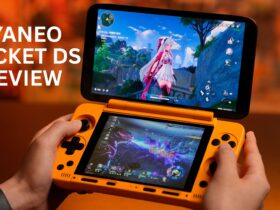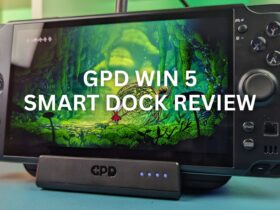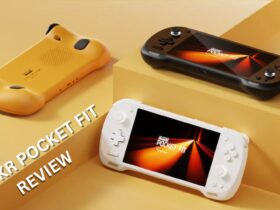"Miyoo Mini
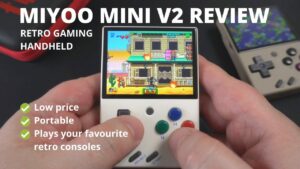
Product Name: Miyoo Mini
Product Description: Low price portable retro gaming handheld
Brand: Miyoo
SKU: MIYOO-MINI-BLACK
MPN: MIYOO-MINI-BLACK
Offer price: 64.95
Currency: GBP
Offer URL: https://droix.eu/lt/product/miyoo-mini/
-
Design
(5)
-
Build Quality
(5)
-
Display
(5)
-
Performance
(4.5)
-
Features
(5)
-
Software
(5)
Santrauka
„Miyoo Mini" yra nebrangus nešiojamasis emuliatorius, kuris, nors ir nedidelis, yra labai funkcionalus, kad galėtų emuliuoti mėgstamas 8 ir 16 bitų retro konsoles.
Bendras
4.9Vartotojo apžvalga
( votes)Privalumai
- Labai nešiojamas
- Maža kaina
- Paruošta naudoti 64 GB kortelė
- Galimybė emuliuoti 8 ir 16 bitų
- Lengva naudoti operacinę sistemą
- 640×480 2,8 colių ekranas atrodo gražiai
- Jei reikia, lengva pakeisti akumuliatorių
- Galima įsigyti puikią pasirinktinę programinę įrangą
Trūkumai
- Kai kurių „PlayStation" žaidimų našumo problemos
Savo " Miyoo Mini" apžvalgoje mes jį išpakuosime, patikrinsime jo operacinės sistemos funkcijas ir išbandysime keletą emuliatorių, kad pamatytume, kaip gerai veikia šis nebrangus retro žaidimų nešiojamasis kompiuteris.
„Miyoo Mini" apžvalgos vaizdo įrašas
„Miyoo Mini v2″ išpakavimas
Pradėkime „Miyoo Mini" apžvalgą nuo išpakavimo. Jis pateikiamas savo individualiame kieto korpuso dėkle, kuriame viskas yra apsaugota.
Viduje yra naudotojo vadovas anglų ir kinų kalbomis, kuriame pateikiamos instrukcijos, kaip naudotis delninuką.
Toliau turime " Miyoo Mini" delninį kompiuterį. Netrukus jį parodysime išsamiau.
Korpuso šoninėje kišenėje yra USB „Micro SD" kortelių skaitytuvas, skirtas žaidimams kopijuoti į pridedamą 64 GB „Micro SD" kortelę. Ir galiausiai - C tipo USB įkrovimo laidas. Šį kabelį rekomenduojame naudoti įkrovimui.
„Miyoo Mini v2″ apžvalga
" Miyoo Mini" retro žaidimų konsolę galima įsigyti dviejų spalvų: sniego baltumo ir retro pilkos. Praneškite mums komentaruose, kuri spalva jums labiausiai patinka?
Jis yra 2,55 x 3,68 x 0,70 colių (6,5 x 9,35 x 1,8 cm) dydžio ir sveria 110 gramų. Tai mažytis ir itin nešiojamas retro rankinis įrenginys!
Ekranas yra 2,8 colio IPS ekranas su 640×480 taškų raiška. Jis iš tikrųjų atrodo gana gražiai retro žaidimams.
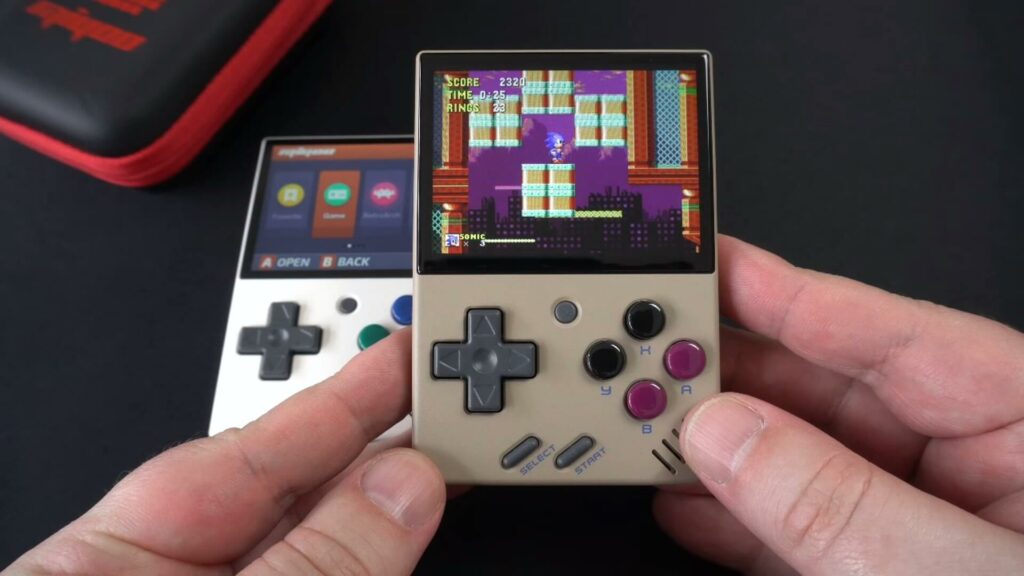
Žemiau yra klasikinis D-Pad, SELECT ir START mygtukai, keturi žaidimų mygtukai ir meniu mygtukas viduryje.
Kairėje pusėje yra garsumo rinkiklis. Viršuje yra būsenos šviesos diodai ir įjungimo mygtukas. O apačioje yra 3,5 mm ausinių lizdas, „Micro SD" kortelės lizdas ir C tipo USB jungtis įkrovimui.
Galinėje pusėje yra kairės ir dešinės pusės mygtukai, kurie tradiciškai yra peties ir trigerio mygtukai. Taip pat yra baterijos dangtelis, todėl prireikus labai lengva pakeisti bateriją.
„Miyoo Mini" techninės specifikacijos
| CPU | Dviejų branduolių „ARM Cortex-A7″. Dažnis iki 1,2 GHz |
| RAM | 128 MB |
| SANDĖLIAVIMAS | Pridedama 64 GB „Micro SD" kortelė. Galima naudoti iki 128 GB „Micro SD" kortelę |
| AKUMULIATORIUS | 2000 mAh akumuliatorius Priklausomai nuo naudojimo, akumuliatorius veikia iki 5 valandų Įkraunamas per C tipo USB jungtį |
OS apžvalga
Tęsdami „Miyoo Mini" apžvalgą, apžvelgiame meniu programinę įrangą.
Kai paleidžiate kompiuterį, rodomas pagrindinis meniu. Naujausi rodomas neseniai žaistų žaidimų sąrašas, o mėgstamiausi - jūsų mėgstamiausi pridėti žaidimai.
Meniu „Žaidimai" rodomas žaidimų sistemų sąrašas, kuriame yra „Arcade", „Mega Drive", „Master System", „Neo Geo", „Neo Geo Pocket", „PC Engine", „PlayStation" ir „WonderSwan Color".
Įėjus į konsolės sistemos meniu rodomas „Micro SD" kortelėje rastų žaidimų sąrašas. Juos galite slinkti naudodami D-Pad arba praleisti puslapį naudodami įrenginio gale esančius paleidimo mygtukus. Tada pasirinkite žaidimą ir jis bus paleistas.
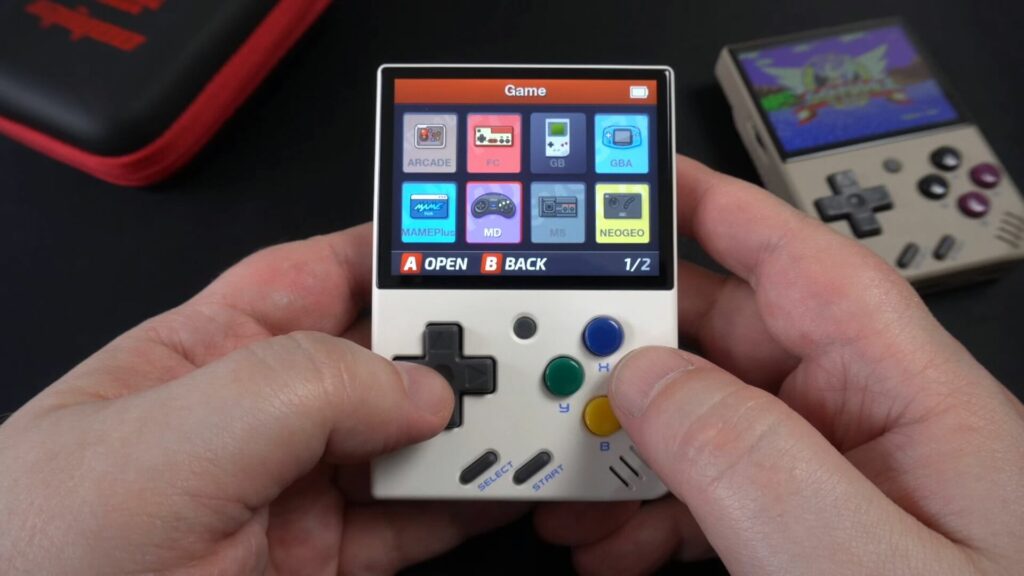
Grįžtant į pagrindinį meniu, toliau pateikiamas „RetroArch" meniu, kuriame naudojami kitokie emuliatoriai nei žaidimų meniu. Vėl galite naršyti žaidimus ir pasirinkti vieną, kurį norite įkelti.
Pagrindiniame meniu yra dar dvi parinktys, jei slinkite į dešinę. Programų meniu yra failų tvarkyklė, prieiga prie „RetroArch" nustatymų ir maitinimo meniu, kuriame galima saugiai išjungti kompiuterį.
Paskutinė parinktis yra meniu Nustatymai, kuriame galite keisti įvairius nustatymus, įskaitant ryškumą, temos spalvas, kalbą ir klavišų atvaizdavimą. Gamyklinių nustatymų atkūrimas ir mygtukų testas.
Galite nukopijuoti žaidimus į atitinkamus sisteminius aplankus „Micro SD" kortelėje, tada paspauskite meniu mygtuką, kad iš naujo nuskaitytumėte „Micro SD" kortelę ir pridėtumėte naujus žaidimus.
„Miyoo Mini v2″ emuliatoriaus bandymai
Taigi, kaip gerai „Miyoo Mini" imituoja populiarias praėjusių metų konsoles? Sužinokime tai atlikę keletą emuliatoriaus testų.
Arkada - Charlie Ninja
Yra visa krūva Rytų rinkos arkadinių žaidimų, kurių niekada nežaidžiau. Atsitiktinis žaidimas, kurį žaidžiu, atrodo, vadinasi „Charlie Ninja". Išbandžiau keletą atsitiktinių žaidimų ir neturėjau jokių problemų dėl žaidimų paleidimo arba jie veikė per lėtai. Atrodo, kad viskas veikia puikiai.
MAME Plus - Outrun
MAME yra daug populiarių vakarietiškų arkadinių žaidimų, kuriuos žinau ir mėgstu. Taigi buvau labiau pažįstamoje teritorijoje. Vėl išbandžiau keletą atsitiktinių žaidimų, įskaitant vieną iš mano mėgstamiausių „OutRun", ir nepastebėjau jokių našumo problemų.
Mega Drive - Sonic The Hedgehog
Negalime išbandyti „Mega Drive", neparodę „Sonic The Hedgehog". Išbandžiau keletą skirtingų žaidimų ir, kaip ir tikėjausi, nesusidūriau su jokiomis suderinamumo ar našumo problemomis. Nesitikėčiau, kad " Miyoo Mini" bus kažkas mažiau.
Neo Geo - Shock Troopers 2nd Squad
Neo Geo yra kitas ir, atrodo, viskas veikia gerai. Pasitaiko tam tikrų sulėtėjimų, kurie labiau susiję su originalia aparatine įranga, o ne su tikruoju „Minis" našumu. Be to, žaidimai veikia gerai.
„Neo Geo" kišeninis kišeninis kišeninis tenisas Spalva
Viskas, kas yra „Neo Geo Pocket", veiks puikiai. Šiame ekrane žaidimai iš tikrųjų atrodo gerai. Tai yra Dievo dovana, jei kada nors bandėte originalų kišeninį nešiojamąjį kompiuterį, kuris neturi ekrano su apšvietimu.
Kompiuterio variklis - Operacija „Wolf
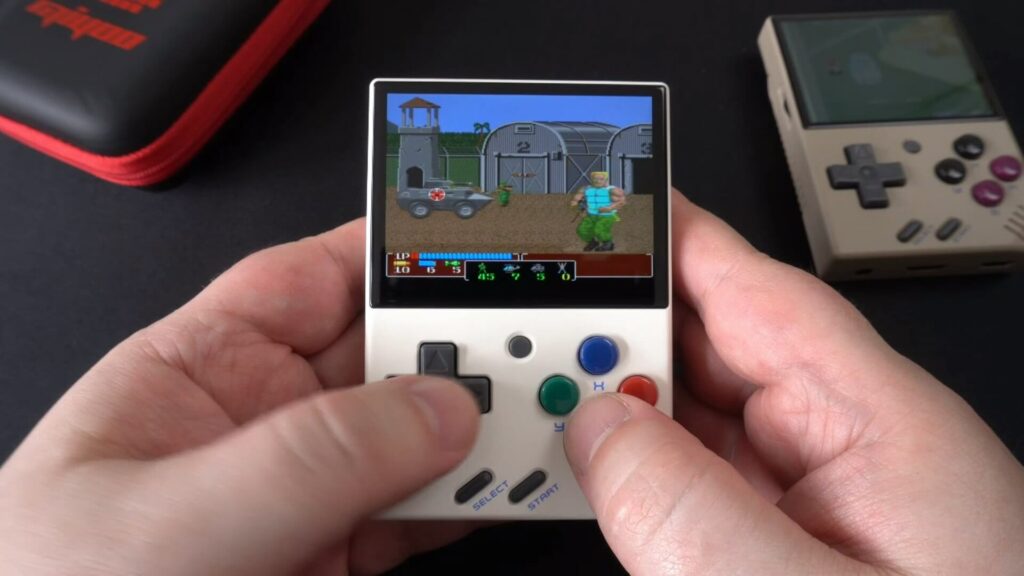
Vėlgi, su „PC Engine" žaidimais neturėsite jokių problemų. Viskas, ką bandžiau, veikia puikiai.
WonderSwan Spalva - auksinis kirvis
„WonderSwan Color" yra dar viena sistema, su kuria neturėsite jokių problemų. Be to, priešingai nei originalioje „WonderSwan" delninėje konsolėje, šios retro konsolės ekrane iš tikrųjų matysite ekraną.
CPS-III - Street FIghter III 3rd Strike
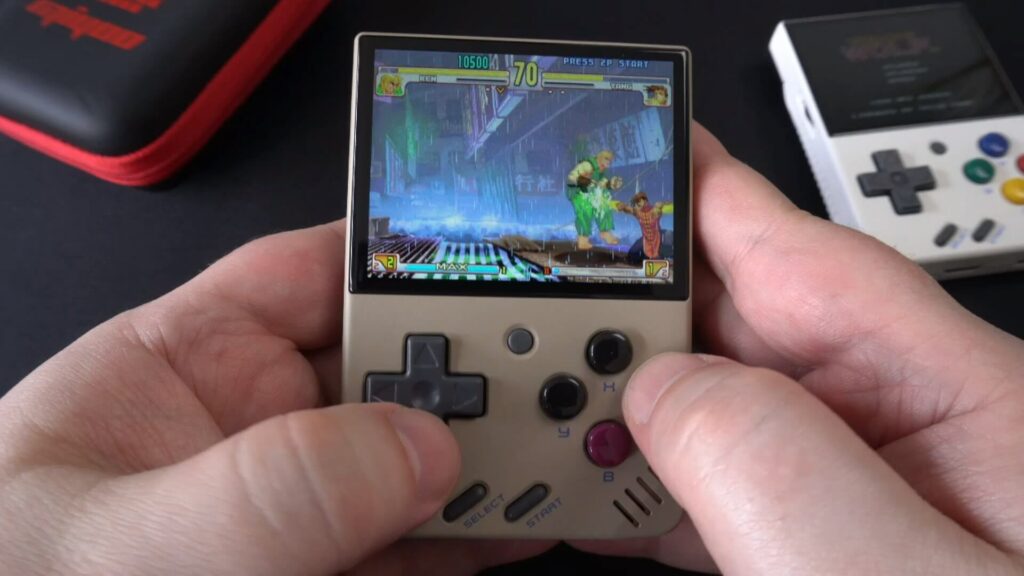
CPS-III žaidimai, palyginti su kitais, įkeliami šiek tiek ilgiau. Palaukite keletą akimirkų, kol bus ištrauktas zip failas ir įkelti visi failai. Bet tai, atrodo, vienintelis mano nusiskundimas, nes visa kita veikia puikiai.
PlayStation - Tekken 3
„PlayStation 1″ pradeda veikti ir neveikti kai kurie žaidimai. Tai daugiausia priklauso nuo suderinamumo, daugiausia nuo to, kaip gerai jis veikia. Tačiau jei naudojate „RetroArch" branduolį PCSX, suderinamumas labai pagerėja. Tačiau vis tiek turėsite žaidimų su našumo problemomis.
„Miyoo Mini" pritaikyta programinė įranga
Vienas dalykas, kurį norėjau paminėti, yra tai, kad galite atnaujinti programinę įrangą į pasirinktinę programinę įrangą, kuri pagerina kai kuriuos dalykus. Tai apima priekinės dalies meniu, taip pat pridedami kai kurie nauji emuliatoriai. Taip pat yra švarus SD kortelės atvaizdas su patobulintu aplankų organizavimu, į kurį galite pridėti savo žaidimus.
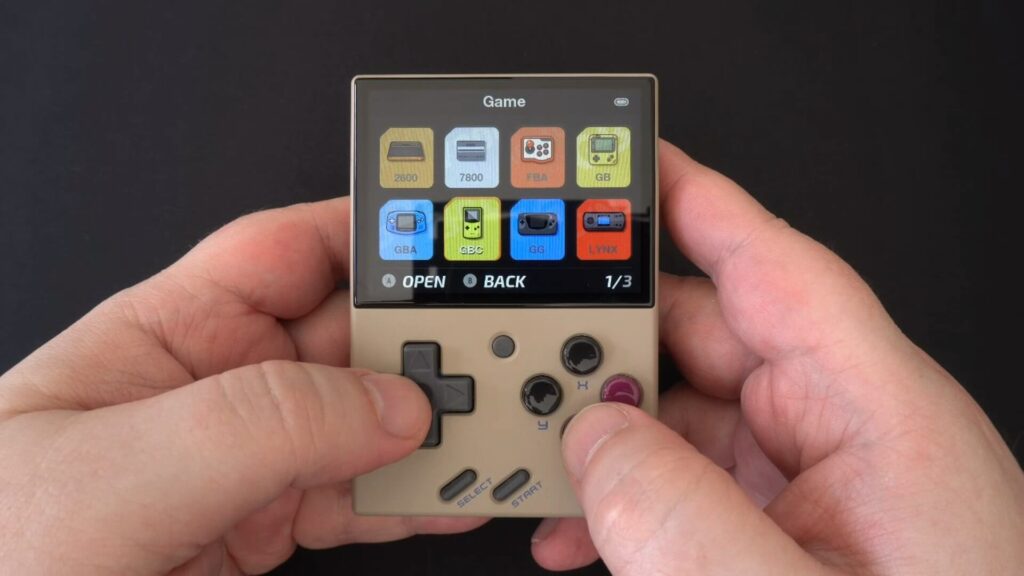
Tam reikia į įrenginį įdiegti programinę įrangą ir sukurti naują SD kortelę, todėl neapsieinama be rizikos. Tačiau „Github" puslapyje https://github.com/Takiiiiiiii/Miyoo-Mini yra aiškus žingsnis po žingsnio vadovas.
Jei atnaujinsite „Miyoo Mini" pasirinktinę programinę įrangą, rasite dar keletą emuliatorių, įskaitant „Atari 2600″ ir „7800″, „Amstrad CPC", „SEGA CD" ir „Virtual Boy". Jei esate pridėtų sistemų gerbėjas, verta pagalvoti apie tai, kad galėtumėte kuo geriau išnaudoti delninio kompiuterio galimybes.
UPDATE: Dar viena pasirinktinė programinė įranga, į kurią turėtumėte atkreipti dėmesį, yra „Onion OS", kuri visiškai pakeičia „Miyoo Mini". Daugiau informacijos apie „Onion OS" galite rasti adresu https://onionui.github.io/.
Galutinės mintys
Apibendrinant „Miyoo Mini" apžvalgą, apskritai ši retro konsolė man paliko didelį įspūdį. Ji yra maža ir lengva, todėl puikiai tinka išvykoms ir kelionėms. Pavyzdžiui, jei norite žaisti žaidimą važiuodami traukiniu ar autobusu, ji lengvai telpa į striukės kišenę ir yra greitai pasiekiama. Nors ekranas mažas, jis atrodo gerai, o žaidimai jame apskritai atrodo gerai.
Man taip pat patiko meniu paprastumas, nors žaidžiant kai kuriomis sistemomis, pvz., „PlayStation", gali būti šiek tiek painu, nes galima rinktis ir iš vietinių emuliatorių, ir iš „RetroArch" branduolių.
Ar verta pirkti „Miyoo Mini"?
Labiausiai mums patinka kaina. Jis yra gana pigesnis už kitus retro delninius kompiuterius, kurių kaina paprastai viršija 100 svarų sterlingų. Ir, išskyrus kai kurias aukštesnės klasės konsoles, palaikomas šiuose delninukuose, jie atlieka beveik tą patį darbą 8 ir 16 bitų sistemoms. Jei nenorite sudaužyti banko arba norite tikrai nešiojamo retro delninuko, tuomet „Miyoo Mini" tikrai verta apsvarstyti!
Kur galima įsigyti „Miyoo Mini"?
Jei jums patiko mūsų „Miyoo Mini" apžvalga, galite sužinoti daugiau ir įsigyti " Miyoo Mini v2″ čia. Čia galite peržiūrėti platų mūsų rankinių žaidimų konsolių asortimentą.
[azp_custom_product id="51″]



